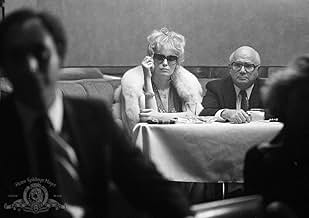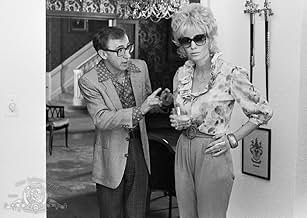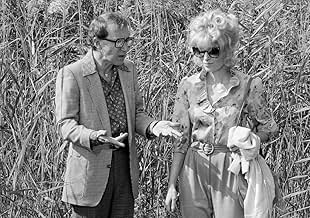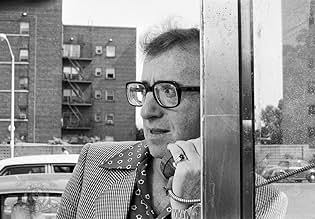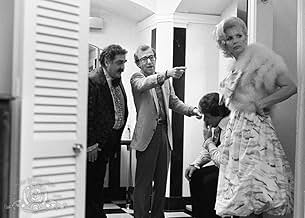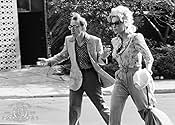Broadway Danny Rose
- 1984
- Tous publics
- 1h 24min
Dans ses efforts pour réconcilier un crooner avec sa maîtresse, un impresario infortuné est pris pour son amant par un gangster jaloux.Dans ses efforts pour réconcilier un crooner avec sa maîtresse, un impresario infortuné est pris pour son amant par un gangster jaloux.Dans ses efforts pour réconcilier un crooner avec sa maîtresse, un impresario infortuné est pris pour son amant par un gangster jaloux.
- Nommé pour 2 Oscars
- 3 victoires et 5 nominations au total
- Johnny's Mother
- (as Gina DeAngelis)
Avis à la une
The story of the film is told by a bunch of entertainers at the Carnegie Deli in Manhattan, reminiscing about Rose (Allen), an agent for the most obscure acts in New York back in the '50s and '60s. One of them claims to have the best Danny Rose story and his telling serves as narration to the film.
The story revolves around Rose and his biggest talent, Lou Canova (Nick Apollo Forte), an old-fashioned Italian crooner doing covers of Sinatra and all kinds of classic tunes from what back then was considered a "bygone era," but Lou is having a resurgence. Problem is he's an alcoholic and a womanizer. He insists on having the woman he's having an affair with attend his big performance at the Waldorf (that could get him a national gig). Other problem is, this Tina (Mia Farrow) was told Lou was cheating on her, so now she's run off to her Italian mob family and through strange circumstances, the mob wants to knock Danny off.
There are elements of classic comedy here, which is why the black and white works for "Danny Rose." At the same time, it's a nostalgic film (the early '80s was full of that for Allen) and an intimate one.
Without spoiling too much, the key to "Danny Rose" relies in the conflict between self- interest and dependency on others. In a way, it's Allen's way of saying thank you or perhaps apologizing to those that have been part of his personal journey.
No one does it alone, especially not Danny Rose, a character whose living is dependent on the talents and aspirations of others and who lives solely by the advice he remembers from deceased relatives. Then there's Lou, who can't perform unless Tina is there but loves his wife dearly, and then Tina, who can't make any major decision without consulting a psychic elderly woman.
"Danny Rose" has some memorable Woody Allen quotes and classically comical situations such as he and Farrow's Tina "wriggling" their way out of some ropes tying them together as a former escape artist client of Danny's used to say, or when they're chased into the Macy's Day Parade balloon warehouse.
The film is simplistic but truthful and it's nice to see Allen make a point that's so universal instead of one about affluent people solving their life crises.
This is accomplished, initially, by the extremely naturalistic dialogue between the comics whose reminiscences form the bulk of the film. Notice how they all talk at once, they cut each other off, and they trample all over each other's lines. We really feel like we're listening in on a diner conversation, rather than watching a theatrical performance of a diner conversation. This gives the film an initial boost of accessibility.
This "charm factor" is cemented once we meet Danny Rose. Now, many people criticize Allen as an actor, claiming that he only ever plays one character... himself. This is absolute rubbish, and "Broadway Danny Rose" proves it. I have never seen Allen play a character so kind, warm, and accepting as Danny Rose. It was quite a pleasant surprise. Danny has to be that good, though, in order for us to accept that Tina is haunted by her betrayal of him.
That denouement, by the way, was really touching. The Thanksgiving scene took a good, funny, enjoyable movie and made it something a little more special. Compare this to the gross-out comedies of today... how many modern comedies can be as funny as "Broadway Danny Rose," and yet still create characters so real and so sympathetic that moments like the Thanksgiving scene can work?
I try not to harp on about how funny Allen's comedies are, because you either like his humor or you don't. If you like it, you don't need me to tell you it's funny, and if you don't, you won't believe me anyway. So why bother? I don't know, but I will say that this film had a good six or eight laugh out loud moments, at least, and it kept me smiling throughout.
Also, after a good debut in "A Midsummer Night's Sex Comedy" and a reduced, subdued role in "Zelig", this is the film where Mia Farrow really comes into her own as Allen's leading lady. For the first time, I don't miss Diana Keaton.
Danny's problem is that as soon as one of his clients makes it to the top, they would drop him in favor of a big-name agent. Danny stuck with a drinking, self-centered Italian crooner Lou who is attempting (and just about to make it) a comeback, and Danny, being a loyal and protective agent, unwittingly gets involved with the singer's girlfriend Tina whose family has a long memory and strong resemblance to Soprano family. No wonder poor Danny needs "a valium the size of a hockey puck". Mia Farrow is almost unrecognizable as a tough and vulgar (but not a dumb) blonde. Her philosophy is her way of life "It's over quick, so have a good time. You see what you want, go for it. Don't pay attention to anyone else. And do it to the other guy first 'cause if you don't he'll do it to you." She obviously acts on her words but in the end of the movie she realizes that the things which count most in life are "acceptance, forgiveness, love" which is Danny's philosophy. She was cast against the type and it worked brilliantly in the funny but touchingly nostalgic movie. "Broadway Danny Rose" is a sparkling gem from the writer/director/star, one and only Woody Allen. I never expect anything else from him.
The absolute beauty of BDR not only comes from (once again) Gordon Willis' inspired chiaroscuro use of black & white photography and framing, Allen's hand-picked jazz score, succinct editing and crafty art direction, but mostly from its marvelous cast of actors -- most esp. Mia Farrow's astounding, beautifully wrought and precise performance. Upon subsequent viewings, her character's soul literally exudes through the epidermis! On top of that, the so-called "slapstick," which initially I viewed askance, turned-out to be far subtler than its initial impact. The right-on performances by BDR's numerous sub-characters also proved to be far more meaningful and poignant then initially viewed.
And, that ending.... What an ending! It has got to be one of the most heartbreaking and romantic finale's in screen history! (I say this with no hyperbole.) I have seen BDR more than two-dozen times, and it has never failed to bring me to tears (as did "Annie Hall," "Manhattan" and, his subsequent, "Hannah and Her Sisters"). The start of the scene (with Farrow's character confronting a heartbroken Allen) is pure beauty and poetry. The finale of Allen running after Farrow through the wet and rough-n-tumble streets of New York, and his (inaudible) "forgiveness" in front of the delicatessen, is nothing less than magical!
In sum, sometimes it takes a different "perspective" in looking at a piece of art to realize that there's much more there than meets the eye. Sort of like Diane Keaton's character in "Manhattan," as she pontificated with much zeal over the "textural" qualities of the "steel cube." Only this time, no pontification is needed: "Broadway Danny Rose" is pure, unadulterated romance through and through! This is a "must-see." Enjoy!
Le saviez-vous
- AnecdotesThe reason Mia Farrow wears sunglasses most of the film is that Woody Allen did not feel she could pass herself as a tough Italian "broad", so he had her wear the sunglasses most of the film to hide her eyes, making her seem more sultry and mysterious.
- GaffesIn one scene, Danny can be seen walking past a movie theater, that advertises Épouvante sur New-York (1982) and Halloween III : Le Sang du sorcier (1982) on the marquee. However, the film is supposed to take place in the late 1960s.
- Citations
Danny Rose: You know what my philosophy of life is? That it's important to have some laughs, no question about it, but you gotta suffer a little too' because, otherwise you miss the whole point to life. And that's how I feel
Tina Vitale: Know what my philosophy of life is?
Danny Rose: I can imagine.
Tina Vitale: It's over quick, so have a good time. You see want you want, you go for it. Don't pay any attention to anyone else. And do it to the other guy first, because, if you don't, he'll do it to you.
Danny Rose: This is a philosophy of life? This is - it sounds like the screenplay to "Murder Incorporated".
- Crédits fousThe guys in the Carnegie Deli continue to banter over part of the end credits.
Meilleurs choix
- How long is Broadway Danny Rose?Alimenté par Alexa
Détails
- Date de sortie
- Pays d’origine
- Langues
- Aussi connu sous le nom de
- Brodvejski Danny Rose
- Lieux de tournage
- Sociétés de production
- Voir plus de crédits d'entreprise sur IMDbPro
Box-office
- Budget
- 8 000 000 $US (estimé)
- Montant brut aux États-Unis et au Canada
- 10 600 497 $US
- Week-end de sortie aux États-Unis et au Canada
- 953 794 $US
- 29 janv. 1984
- Montant brut mondial
- 10 600 497 $US
- Durée1 heure 24 minutes
- Couleur
- Mixage
- Rapport de forme
- 1.85 : 1
Contribuer à cette page



